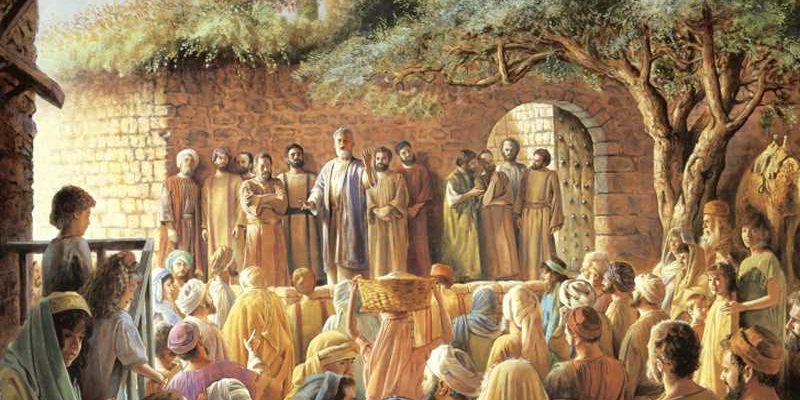
We Cannot Stop Speaking About What We Have Seen and Heard: Preaching Like Peter
As one of the inner circle of disciples closest to Jesus, Simon Peter’s apostolic, eye-witness proclamation is an indispensable study for anyone who desires their preaching to follow a biblical model. Unfortunately, unlike modern preachers, we do not have any audio or video recordings of Peter’s preaching, there are no published volumes of his sermons, nor any transcript of an entire sermon he preached. What we do have are brief summations, collected and translated into Greek by Luke, then placed into the narrative of the Acts. Additionally, according to the 4th century church historian Eusebius, preserving the much earlier testimony of Papias, we have in the Second Gospel Mark’s summary of Peter’s preaching. Furthermore, we have two letters Peter wrote to believers, which as public documents intended for reading aloud in the gathering of believers, should also be recognized as expressions of the teaching proclamation of the apostle who identifies himself as a “fellow elder” of the church.
Christological Preaching
The most notable feature of Peter’s preaching is the centrality of the gospel. The focus is on Jesus, and the atoning nature of His death on the cross. He opportunistically began with the present circumstances of his listeners and their response to the manifestation of God’s supernatural presence, but he quickly redirects attention to Jesus and the gospel, declaring that it was by His power healing occurs, that this One whom they participated in crucifying, God raised from the dead, and made Him both Lord and Christ. The literary structure of the Gospel identified as preserving his preaching places primary focus on the cross. The fast paced movement of the first eight chapters, the three passion predictions of 8:27-10:52, and the expansive detailing of the final week leading to the death of Jesus all highlight and emphasize the centrality of the cross and Jesus’ atoning sacrifice. The most notable feature of Peter’s preaching is the centrality of the gospel. Click To Tweet
Peter’s preaching is undergirded by his conviction of God’s sovereign hand in all things, as revealed in Scripture. He reminded the church gathered in the upper room in Acts 1 and publicly declared in his evangelistic preaching that Jesus’ death was what God had predetermined and prophesied beforehand. Scripture is the interpretive foundation for understanding everything that has occurred. The prophet Joel provides the explanation for the miracle of tongues at Pentecost, along with the psalmist David and God’s promise of an eternal Davidic reign from 2 Samuel 7. In Acts 3 Peter uses Old Testament servant language from Isaiah, and Moses’ words in the Pentateuch to proclaim God’s saving work in Jesus. Before the hostile hearers who comprised the Sanhedrin, Peter identifies Jesus as the rejected cornerstone of Psalm 118, an identification he expands in his first letter to assure the believers in Asia Minor, assuring them that they too were living stones.
In the record of Peter’s preaching that is Mark’s Gospel, Isaiah is cited in the very first sentence after the title, introducing the ministry of John the Baptist. Jesus cites the Old Testament from the beginning of His ministry until His final words from the cross, a citation of the beginning of Psalm 22. Peter recognized Scripture as God’s trustworthy revelation the foundation for understanding the incarnational presence of Jesus and His salvific work. This Christological understanding of the Old Testament undergirds his sermons in Acts, the narrative preservation of his preaching in Mark, and his authoritative letters.
Peter was a preacher, who being human like us, possessed his own deeply rooted prejudices. Like most Jews of his day, he did not conceive of salvation apart from the practices of Judaism. But unlike many of us, he was open to God’s correction. It took a special revelation, but he came to understand that by God’s grace, salvation was available to all peoples, without participation in Judaism. And he publicly and transparently used his experience of God’s correction to help others overcome their prejudices.
At the end of his first letter Peter provides us a glimpse into his understanding of the character and characteristics of those who faithfully discharge their divine assignment to shepherd God’s flock and proclaim His truth. In exhorting his “fellow elders” (preacher/teachers like himself), Peter declares that the preacher of the gospel must be humble, with motives that are pure and not directed towards self-advantage or self-advancement. The truth must not be both proclaimed and lived out among God’s flock as an example. The shepherd’s manner towards those he is instructing must be gentle and not overbearing, even as Jesus was toward Peter in the loving restoration and commissioning in John 21.
Confident Preaching
It is in his appearances before the Jewish council that Peter reveals the inner compulsion that drives his preaching ministry. He, together with John, is recognized as possessing a bold confidence in the gospel being proclaimed, that was not explained by any formal training (4:13). They give no consideration for the possible consequences to personal safety and well-being for not heeding the warnings. When miraculously delivered from a prison cell, he along with the other apostles, obediently returns to the temple complex, their opponents home field. They resume preaching the good news of Life in Jesus, the very action for which they were arrested (5:20-26). When threatened again, Peter explains the power that drives him to preach God’s truth: God must and will be obeyed in his life, God has raised the One they crucified on a cross, and he is now exalted as Prince and Savior, and Peter and the other apostles, together with the Holy Spirit are the witnesses entrusted with this truth (5:29-32).
There is much to be learned from Peter’s example for those who in every era preach the gospel to the lost and minister the Word to God’s flock. The only message we have to proclaim is the good news of salvation in Jesus, by the grace of God, and its implication for all of life. Jesus is the focus, and the salvific work on the cross, and the power of the resurrection must be central to all we proclaim. The Scripture in its entirety, Old and New Testaments, is God’s inerrant, trustworthy, fully sufficient Word for our lives. We acknowledge our human frailty and capacity to be wrong. We who would preach biblically and faithfully must walk close to God, humbly seeking and accepting His correction. We must minister His Word in gentleness, motivated only by our love for God, our love for His sheep, and our love for the lost, while boldly demonstrate our unwavering confidence in God and His Word, with no concern for the possible consequences of our faithful obedience. May it be true of all of us who preach the gospel, that when it comes to the good news of the salvation that by God’s grace is made available through Jesus, “we cannot stop speaking of the things which we have seen and heard.”

